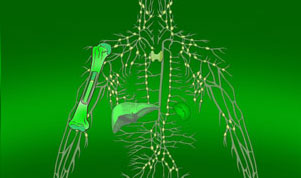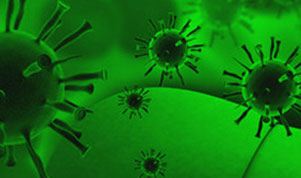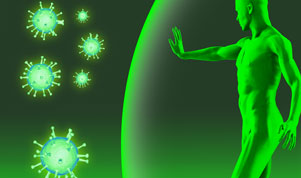Secondary Immunodeficiencies
Otherwise known as acquired immunodeficiencies, they are much more common than primary immunodeficiencies. Secondary immunodeficiencies most often occur in diseases such as diabetes, sickle cell anaemia, rubella, leukaemia, chicken pox and various bacterial infections. The cause of secondary immunodeficiency can be malnutrition, surgery, burns or organ transplants and the administration of immunosuppressive drugs. Other causes can be diseases of the haematopoietic system, as well as autoimmune diseases. It can also be caused by HIV (Human Immunodeficieny Virus). AIDS, a disease caused by HIV, is also referred to as Acquired Immunodeficiency Syndrome. The result of HIV infection is a decrease in the number of lymphocyte-T cells, which makes the body more susceptible to diseases which, with normal immunity, pose no threat, but which can be fatal for HIV-positive people. Patients very often have atypical pneumonias, fungal infections, tumours and defects in the nervous system that eventually lead to death. Secondary immunodeficiencies are acquired and most often caused by iatrogenic disorders. The use of various immunosuppressive drugs, anti-cancer drugs or certain antibiotics further reduces immunity.
A number of situations in which immune disorders/deficiencies occur are summarised below.
Immune disorder of the elderly
Related to cellular immunity
- Gradual decline in the number of T lymphocytes after the age of 70
- An increase in the number of CD4 lymphocytes and a decrease in the number of CD8 lymphocytes
- Residual thymus function
- Increase in CD45RO expression, decrease in CD45RA expression
- Decrease in the expression of IL-2, IL-4 and INF-γ
- Weakening of the proliferative response of lymphocytes after stimulation with PHA and ConA
- Reducing the frequency of positive DTH reactions and weakening their intensity
Related to humoral immunity
- Decrease in IgM, IgE and IgD levels, increase in IgG levels
- Decrease in the titer of natural antibodies
- Increased titer of autoantibodies and anti-idiotypic antibodies
- Decrease in the number of CD5(-) B cells and increase in CD5(+) B cells after the age of 70
- Increased synthesis of IL-4, IL-5, IL-6, increased INF-γ activity
Immune disorders in renal failure
- Prolonged tolerance to allogeneic transplant
- Increased susceptibility to infections
- Increased cases of neoplasia
- Incorrect reaction to vaccines against viral infections (flu, hepatitis)
Immune disorders in uremia
- Chronic protein and calorie deficiency (insufficient supply, absorption disorders, excessive loss)
- Deficiencies of Zn, vitamins B6 and E
- Iron overload (ferritin over 500 mcg/l)
- Low- and high-molecular-weight uremic toxins
- Chronic dialysis therapy
Immune disfunction after surgery
- Occurrence of cutaneous anergy
- Decrease in IgG and IgM (preoperatively) against bacterial endotoxins
- A large decrease (>50%) in the number of lymphocytes on the 1st day after the procedure
- Increased neutrophil activity on the 1st - 2nd day
- Decrease (20-30%) of activated monocytes
- Increased IL-6 concentration
Drug-induced immune disorders
After treatment with cytostatics
- Late neutropenia 35 – 45 days (irreversible damage to the myeloid stem cell)
- Early neutropenia 7 – 14 days (reversible damage to the myeloid stem cell)
With other drugs - the drug (hapten) triggers abnormal destruction of granulocytes
After long-term use of glucocorticosteroids - inhibition of granulocyte function
Effect of glucocorticosteroids
- Apoptosis of lymphocytes activated by allo- and autoantigens
- Reducing the expression of MCH antigens and adhesion molecules on cell surfaces
- Inhibition of nitric oxide synthase induction in macrophages
- Impaired function of cytotoxic lymphocytes and NK cells
- Inhibition of monocyte and macrophage functions
Infections complicating immunosuppressive treatment
- Cytomegalovirus (CMV) infection - in 80% of the population in youth it is asymptomatic, symptoms occur with reduced immunity
- Acute varicella zoster virus (VZV) infection
- Acute herpes virus infection (Herpes Simplex Virus – HSV)
- Tuberculosis and mycobacterioses
- Fungal infections (candida, cryptococcus, aspergillus)
- Pneumocystis pneumonia or PCP is a fungal infection
Stress and Immunity
Experimental studies on animals under stress show a decrease in cellular response indexes.
- Decrease in the number of lymphocytes
- Quantitative disorders of subpopulations
- Decrease in NK cell activity
- Decrease in the proliferative response to the antigen
- Phagocytosis disorders
Chronic stress → hypothalamus → pituitary gland → sympathetic system → ACTH, catecholamines, opioids → decreased IL2 production
Immune Disorders due to Ionising Radiation
- Total body irradiation = Total Lymphoid Irradiation
- The greatest excitability of dividing cells, e.g. lymphocytes stimulated by alloantigen
- Th lymphocytes more sensitive than Ts lymphocytes
- Macrophages and NK cells relatively resistant to irradiation
Immune disorders and certain cancers
The immune system performs immunological surveillance that prevents cancer by early detection and destruction of atypical cells. Immunosuppression and impaired immunity may lead to viral infections, which in turn may contribute to the development of a number of cancer diseases:
- Non-Hodgkin lymphomas (Epstein-Barr Virus – EBV)
- Kaposi sarcoma (human immunodeficiency virus – HIV)
- Skin cancer and rectal cancer (human papilloma virus – HPV)
- Primary liver cancer (hepatitis B virus – HBV)
Humoral Immune Disorders in the Course of Cancer
- Cytokines (mainly TGF-beta transforming growth factor) secreted by cancer cells (oat cell carcinoma, mesothelioma, Hodgkin's disease)
- Prostaglandins (mainly PGE2) secreted by macrophages (head and neck cancer)
- Gangliosides produced, i.a., by macrophages, erythrocytes, liver cells
Cellular Immune Disorders in the Course of Cancer
General:
- Reduction in the number of lymphocytes
- Decrease in the population of CD4 lymphocytes
- Decrease or reversal of CD4/CD8 ratio
- Weakened NK cells activity
Local (Cancer region, regional lymph nodes):
- Reduction in the number and dysfunction of mononuclear cells
Immune Disorders in the Course of Famine Disease
Fortunately, in our country and in Europe, hunger disease practically does not occur spontaneously. It may manifest itself in the course of other severe and long-term diseases, including: in the course of cancer, tuberculosis, pneumonia, severe diarrhea. Hunger disease is typical of war-affected regions and sub-Saharan Africa. In Europe in the 20th century, there were regions affected by famine, e.g. the great famine in Ukraine in 1932 - 1933, and famine in Nazi concentration camps or in the Nazi ghettos for Jews. In the course of starvation disease, a number of body disorders occur, including those in the immune system.
- Impaired cellular response
- Impaired phagocytosis
- Impaired production of cytokines, antibodies and complement system proteins
- Atrophy of the thymus and thymus-dependent lymph node zones
Other Secondary Immune Disorders
- In the course of infection (HIV, HTLV1 (Human T-cell Leukemia Virus), measles virus, tuberculosis
- Nutritional deficiencies (zinc, iron, vitamins A, E, B, folic acid)
- Endocrinopathy (hyperthyroidism, Cushing's disease, diabetes, hyperparathyroidism)
- Conditions after injuries, after extensive burns, deep hypothermia
- Protein loss (exudative enteropathies, nephrotic syndrome)
- Alcoholism, drug addiction









